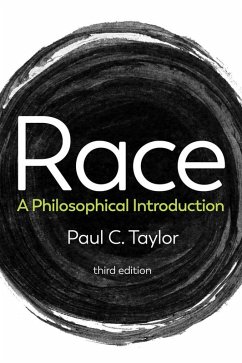The third edition of Race: A Philosophical Introduction continues to provide the definitive guide to a topic of major contemporary importance. In this thoroughly updated and revised volume, Paul Taylor outlines the main features and implications of race-thinking, while engaging the ideas of important figures such as Linda Alcoff, K. Anthony Appiah, W. E. B. Du Bois, Michel Foucault and Sally Haslanger. The result is a comprehensive but accessible introduction to philosophical race theory and to a non-biological and situational notion of race, which blends metaphysics and social epistemology, aesthetics, analytic philosophy and pragmatic philosophy of experience.
Taylor approaches the key questions in philosophy of race: What is race-thinking? Don't we know better than to talk about race now? Are there any races? What is it like to have a racial identity? And how important, ethically, is color blindness? On the way to answering these questions, he takes up topics such as mixed-race identity, white supremacy, the relationship between the race concept and other social identity categories, and the impact of race-thinking on our erotic and romantic lives. The concluding section explores the racially fraught issues of policing, immigration, and global justice, and the implications of the political upheavals of the past decade, from the election of Donald Trump to the global upsurge in anti-immigrant populism.
Updated throughout, Race remains a vital resource for the educated general reader as well as for students and scholars of ethnic studies, philosophy, sociology, and related fields.
Hinweis: Dieser Artikel kann nur an eine deutsche Lieferadresse ausgeliefert werden.
Taylor approaches the key questions in philosophy of race: What is race-thinking? Don't we know better than to talk about race now? Are there any races? What is it like to have a racial identity? And how important, ethically, is color blindness? On the way to answering these questions, he takes up topics such as mixed-race identity, white supremacy, the relationship between the race concept and other social identity categories, and the impact of race-thinking on our erotic and romantic lives. The concluding section explores the racially fraught issues of policing, immigration, and global justice, and the implications of the political upheavals of the past decade, from the election of Donald Trump to the global upsurge in anti-immigrant populism.
Updated throughout, Race remains a vital resource for the educated general reader as well as for students and scholars of ethnic studies, philosophy, sociology, and related fields.
Hinweis: Dieser Artikel kann nur an eine deutsche Lieferadresse ausgeliefert werden.
"Nearly twenty years after its first publication, this book remains the gold standard in the field. This welcome new edition updates its treatment to keep up with the dramatic developments of recent years, above all the shift from the supposed advent of a post-racial United States, symbolized by the Obama presidency, to the unabashed invocation by Donald Trump of a white-supremacist past that had never really gone away."
Charles Mills, CUNY
"Race: A Philosophical Introduction has proven itself time and time again to be the best introductory text on philosophy of race, with each new edition confirming this status. This third edition proves its worth with updated points of reference, reshaped arguments, and structural re-organization. The result is yet another original and incisive text that will benefit students and challenge scholars."
Chike Jeffers, Dalhousie University
Charles Mills, CUNY
"Race: A Philosophical Introduction has proven itself time and time again to be the best introductory text on philosophy of race, with each new edition confirming this status. This third edition proves its worth with updated points of reference, reshaped arguments, and structural re-organization. The result is yet another original and incisive text that will benefit students and challenge scholars."
Chike Jeffers, Dalhousie University








